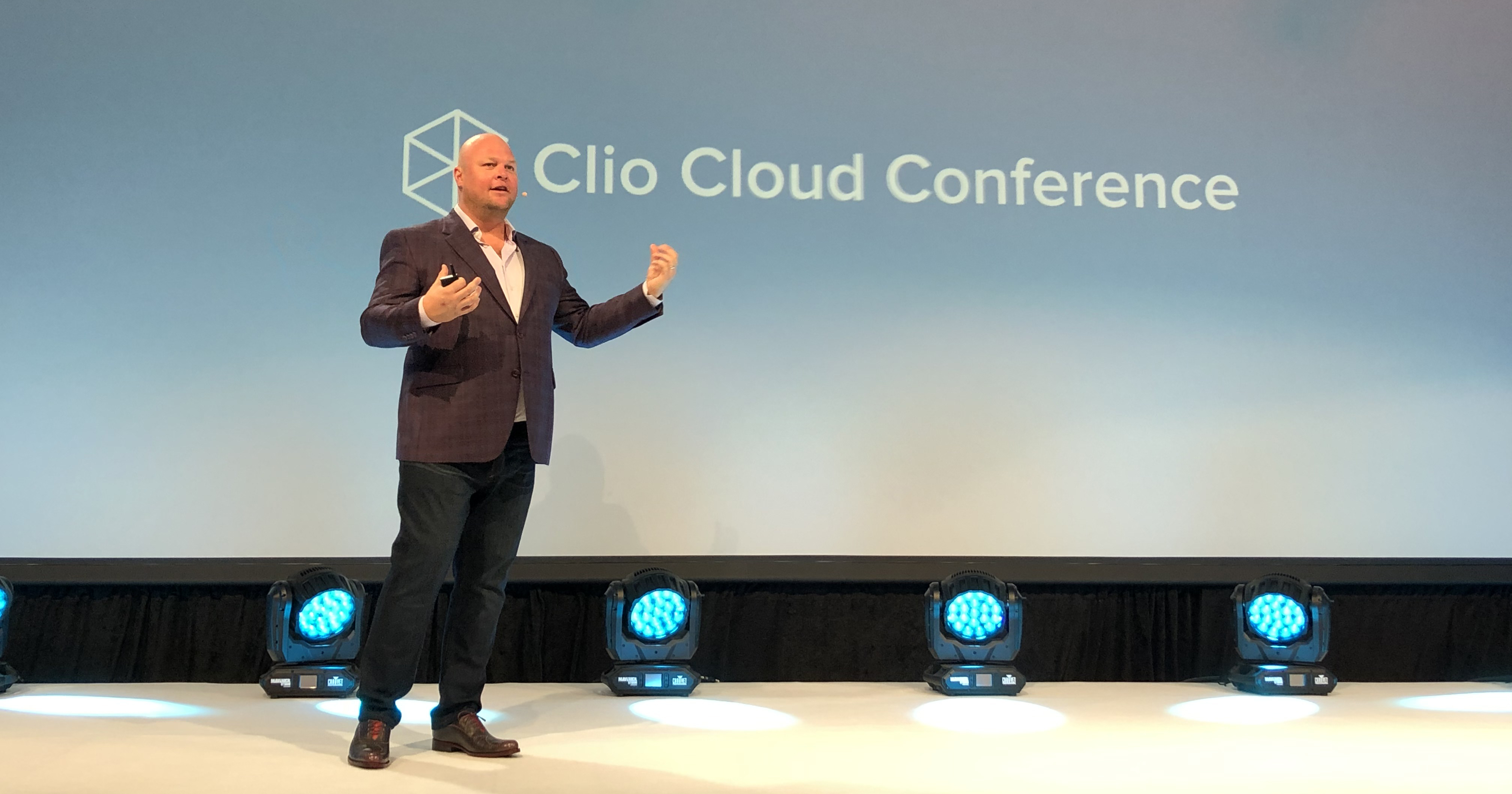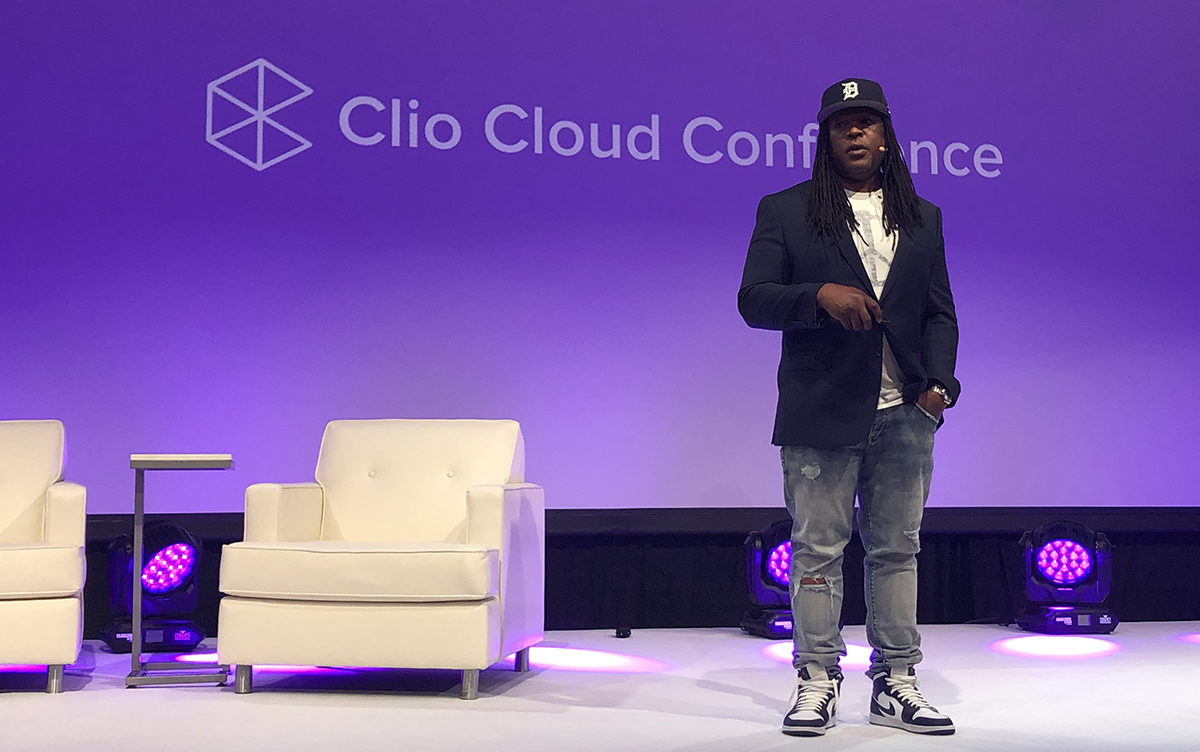Sweat the small stuff: Little changes can make lawyers more productive

Clio CEO Jack Newton speaks at Clio Cloud Conference in San Diego. Photos by Lyle Moran
The power of small changes to produce sustainable business growth and other beneficial outcomes was a recurring theme of the 2019 Clio Cloud Conference that concluded Tuesday.
The 2,000 reported attendees—a new record for the annual gathering in its 7th year—also heard from high-profile speakers urging lawyers to do more to prioritize privacy and advance criminal justice system reforms. (The ABA Journal served as one of the media partners.)
Clio CEO Jack Newton kicked off the festivities Monday at the Manchester Grand Hyatt San Diego with a keynote speech highlighting data from the company’s latest Legal Trends Report indicating that the major difference between growing and shrinking law firms were their utilization rates. Those rates are calculated by taking the number of billable hours worked by a lawyer in a day and dividing it by the number of hours in the workday.
According to the report, firms that grew their revenues by 20% or more over five years saw their utilization rates rise from 28% to 33%. The firms in that category saw average revenue growth of 112% from 2013-2017.
“What it really shows us is that the cumulative impact of small improvements on a yearly basis can really amplify over the course of a five-year period,” Newton said.
He also noted that working just 20 more billable hours annually generates 1% growth in utilization rates. “If you find a way of investing in a tool, a technology, a workflow or a process that helps you get back 20 hours of billable time a year, that is putting you on the path to being a growing firm,” Newton said.
Using document automation software or AI-based legal research tools are a couple steps attorneys can take to boost their efficiency, Newton said in a later interview.
Bestselling author Daniel Pink gave lawyers several tips for making the most of their time during his Tuesday afternoon keynote.
He recommended that attorneys complete analytic work, such as writing a brief, when they are at their peak in terms of their mood and cognitive abilities. For roughly 80% of people, that time is early in the day.
“Analytic work is simply work that requires heads-down focus and attention,” said Pink, author of When: The Scientific Secrets of Perfect Timing.
Pink said the early afternoon, which is when most people start to lose steam and their mood is not as good, is the best time to undertake administrative duties. He suggested lawyers tackle “insight” tasks such as crafting new legal arguments or developing innovative business development approaches in the late afternoon.
Meanwhile, attendees also heard from Clio executives about consumers’ expectations when they are trying to find a lawyer and how legal professionals are doing in trying to meet those expectations.
Roughly 79% of the 2,000 consumers surveyed said they expected a response within 24 hours of contacting an attorney, and 42% of clients said they stopped shopping if they liked the first lawyer they spoke with during their search.
Clio decided to put 1,000 law firms to the test by contacting them posing as a potential client.
The company said 60% of the firms did not respond at all to an email that was sent.
Clio also phoned 500 of those firms. Just 56% of the calls were answered, and 39% went to voicemail.
“There is so much market potential to be unlocked by doing simple things like picking up the phone, responding to an email and communicating with clients in the channel in which they prefer to be communicated with,” said Newton, who announced he would be publishing his first book early next year, titled: The Client-Centered Law Firm: How to Succeed in an Experience-Driven World.
Clio Cloud attendees also received a variety of advice about what to do once they have secured clients. Pulitzer Prize-winning journalist Glenn Greenwald said during his keynote address Monday afternoon that lawyers were among those professionals who could do a better job protecting the privacy of their clients.
“Every single day privacy activists … have been working tirelessly to develop tools that are now easily used in order to apply encryption to the work you do,” he said. “It’s almost harder not to use encryption than it is to use encryption in order to safeguard the secrecy of your clients.”
Greenwald, best known for his reporting about government surveillance programs based on documents provided by Edward Snowden, also spoke about the role privacy can play in spurring innovation and the challenging of orthodoxies.
“Having a place where you can go without societal eyes judging you and watching you, that is the place where things like exploration and creativity and dissent exclusively reside,” he said. “And conversely, a society in which there is no privacy, in which the state has the capacity to listen to your phone calls and read your emails at any moment even if they are not doing that, is one that breeds conformity, and submission and obedience.”
Clio Cloud’s focus on innovation also included Casetext winning the $100,000 Launch//Code Contest. The legal research platform bested four other finalists to win the competition for the title of “Best New Integration.”

Author Shaka Senghor.
Additionally, the two keynote speakers Tuesday morning urged legal professionals to support reforms of the criminal justice system, particularly those that provide offenders with second chances.
Shaka Senghor, author of the bestselling memoir, Writing My Wrongs: Life, Death and Redemption in an American Prison, spent nearly two decades in prison for murder. He called solitary confinement barbaric and inhumane, but he said the years he spent in solitary are where his journey toward becoming an acclaimed writer began.
“Ten years ago, I was in prison cell. Today, I’m free and successful,” Senghor said. “But there are thousands of people coming home every day that society refuses to forgive. There are thousands of people who are suffering in solitary confinement with mental illness because we refuse to take a glimpse inside our penal system. I think that the people in this room have the power, and the courage and the wisdom to change that.”
Deanna Van Buren, co-founder of California-based Designing Justice + Designing Spaces, spoke about her nonprofit’s efforts to promote restorative justice with the aim of reducing mass incarceration.
She described restorative justice as an approach emphasizing meetings between victims and perpetrators with the goal of determining how the offenders can repair the harm they have caused.
“These are intense dialogues where people come together to address the offender’s conduct, creating a plan so they can return to their community unstigmatized,” Van Buren said. “It is all about second chances.”
The Clio Cloud Conference will return to San Diego next year on Oct. 15-16.
Lyle Moran is a San Diego-based freelance reporter who specializes in legal issues. He has previously reported for the Associated Press, Los Angeles Daily Journal, San Diego Daily Transcript and the Lowell Sun.
See also:
ABAJournal.com: “2019 Clio Cloud Conference aims to help lawyers determine their own metrics for success”



